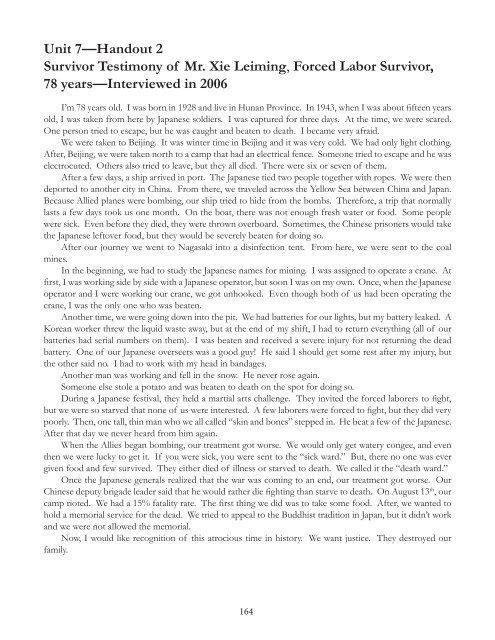Download - Canada ALPHA
Download - Canada ALPHA
Download - Canada ALPHA
You also want an ePaper? Increase the reach of your titles
YUMPU automatically turns print PDFs into web optimized ePapers that Google loves.
Unit 7—Handout 2<br />
Survivor Testimony of Mr. Xie Leiming, Forced Labor Survivor,<br />
78 years—Interviewed in 2006<br />
I’m 78 years old. I was born in 1928 and live in Hunan Province. In 1943, when I was about fi fteen years<br />
old, I was taken from here by Japanese soldiers. I was captured for three days. At the time, we were scared.<br />
One person tried to escape, but he was caught and beaten to death. I became very afraid.<br />
We were taken to Beijing. It was winter time in Beijing and it was very cold. We had only light clothing.<br />
After, Beijing, we were taken north to a camp that had an electrical fence. Someone tried to escape and he was<br />
electrocuted. Others also tried to leave, but they all died. There were six or seven of them.<br />
After a few days, a ship arrived in port. The Japanese tied two people together with ropes. We were then<br />
deported to another city in China. From there, we traveled across the Yellow Sea between China and Japan.<br />
Because Allied planes were bombing, our ship tried to hide from the bombs. Therefore, a trip that normally<br />
lasts a few days took us one month. On the boat, there was not enough fresh water or food. Some people<br />
were sick. Even before they died, they were thrown overboard. Sometimes, the Chinese prisoners would take<br />
the Japanese leftover food, but they would be severely beaten for doing so.<br />
After our journey we went to Nagasaki into a disinfection tent. From here, we were sent to the coal<br />
mines.<br />
In the beginning, we had to study the Japanese names for mining. I was assigned to operate a crane. At<br />
fi rst, I was working side by side with a Japanese operator, but soon I was on my own. Once, when the Japanese<br />
operator and I were working our crane, we got unhooked. Even though both of us had been operating the<br />
crane, I was the only one who was beaten.<br />
Another time, we were going down into the pit. We had batteries for our lights, but my battery leaked. A<br />
Korean worker threw the liquid waste away, but at the end of my shift, I had to return everything (all of our<br />
batteries had serial numbers on them). I was beaten and received a severe injury for not returning the dead<br />
battery. One of our Japanese overseers was a good guy! He said I should get some rest after my injury, but<br />
the other said no. I had to work with my head in bandages.<br />
Another man was working and fell in the snow. He never rose again.<br />
Someone else stole a potato and was beaten to death on the spot for doing so.<br />
During a Japanese festival, they held a martial arts challenge. They invited the forced laborers to fi ght,<br />
but we were so starved that none of us were interested. A few laborers were forced to fi ght, but they did very<br />
poorly. Then, one tall, thin man who we all called “skin and bones” stepped in. He beat a few of the Japanese.<br />
After that day we never heard from him again.<br />
When the Allies began bombing, our treatment got worse. We would only get watery congee, and even<br />
then we were lucky to get it. If you were sick, you were sent to the “sick ward.” But, there no one was ever<br />
given food and few survived. They either died of illness or starved to death. We called it the “death ward.”<br />
Once the Japanese generals realized that the war was coming to an end, our treatment got worse. Our<br />
Chinese deputy brigade leader said that he would rather die fi ghting than starve to death. On August 13 th , our<br />
camp rioted. We had a 15% fatality rate. The fi rst thing we did was to take some food. After, we wanted to<br />
hold a memorial service for the dead. We tried to appeal to the Buddhist tradition in Japan, but it didn’t work<br />
and we were not allowed the memorial.<br />
Now, I would like recognition of this atrocious time in history. We want justice. They destroyed our<br />
family.<br />
164


